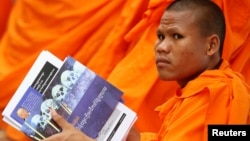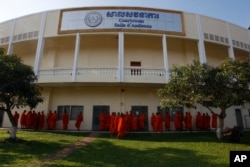The debate over the future of the Extraordinary Chambers in the Courts of Cambodia (ECCC) and if it has been able to deliver justice to the victims of the Khmer Rouge is one that riles up passions among Cambodians, academics, observers and the media.
It is a debate that will likely have no definitive conclusion. However, a recent survey brings up another question regarding the legacy of the Khmer Rouge Tribunal – the preservation of the vast troves of documents that make up the ECCC archives.
A survey, titled the “Public Opinion Study on the Disposition and Custody of the ECCC's Archives,” finds that a large number of respondents want these archives to be handled by an apolitical, credible and well-resourced organization, with the National Library and Documentation Center of Cambodia (DC-Cam) topping the list.
The survey was released as the hybrid court enters an uncertain period for its survival. To date, only one case involving torture center chief Comrade Duch has completed the entire judicial process.
The appeals process of Case 002 is in limbo following the death of Khmer Rouge leader Nuon Chea, who along with Khieu Samphan have been convicted for crimes against humanity, but are currently contesting their genocide convictions. Other cases made little to no progress.
Experts and court observers have suggested that after 13 years and $300 million the UN-assisted Cambodian court is likely to meet a swift end, probably sometime next year.
The survey sampled academics, key informants, survivors, and the general public asking them who should handle the tribunal’s archives, which importantly serves as a historical tracker of events since the rise of the Khmer Rouge. The survey was published by DC-Cam and conducted by Business Development Link (Cambodia), an advertising and marketing company, according to its website.
While he is unsure of the court’s future, Bou Meng, a 78-year-old survivor of the S-21 interrogation center, is certain that he trusts only DC-Cam to hold the archives, which include historical and legal documents.
“In my view, those documents should be placed at Youk Chhang's organization’s library because I am afraid that they could get lost if stored somewhere else,” said Bou Meng, referring to DC-Cam’s director.
“People know Youk Chhang's organization, but not any others,” he added.
Bou Meng’s opinion is in line with most of the respondents to the survey.
An overwhelming majority of people questioned wanted the archive to be in a safe and secure location in Cambodia, and managed by a neutral and non-political organization. More than 80 percent of respondents wanted to ensure easy access to the archives and technology that will help preserve the documents.
Asked for specifics, the National Library and DC-Cam received the most responses for housing the archives, beating out the government-run Legal Documentation Center Relating to the Extraordinary Chambers in the Courts of Cambodia stored under the management of the Council of Ministers.
The survey interviewed more than 1,500 people in five major provinces: Battambang, Kampong Cham, Prey Veng, Kandal and Phnom Penh.
Youk Chhang, director of DC-Cam, said the survey results show that a majority of Cambodians want the court's archives to be maintained by a credible and independent institution, which was not affiliated with political institutions or individuals.
“The people's concerns make them think that the archives are complex and comprehensive, so they focus on a place that is reliable, transparent, independent and free from politics and does not serve any foreign or government agencies,” he told VOA Khmer.
And that it was critical that the institution tasked with handling historically important documents needed to be politically neutral, said Markus Zimmer, an advisor to the DC-Cam and involved with the survey.
“What the survey showed is that there is some distrust among the Cambodian people of the capacity of the Cambodian government or its agencies to care for these documents,” he said in a phone interview.
According to court officials, documents relating to the Duch conviction have already been archived at the government's documentation center and more recent documents were making their way to the center.
But, Zimmer, who worked at the ECCC in 2010, felt the existence of political inference in the court's proceedings so far raised red flags over the government documentation center's ability to safely house the archives.
The court has been riddled with allegations of political interference since its inception, given the Hun Sen government’s uneasiness with the establishment of the tribunal. Leading Cambodian politicians including the prime minister were part of the Khmer Rouge before defecting in the late 1970s and joining Vietnamese-backed forces that eventually ousted the ultra-communist group from Phnom Penh.
“There's no history there that demonstrates that the Legal Documentation Center can be entrusted with all those documents,” Zimmer said.
Both Zimmer and Youk Chhang said the survey’s findings were an indicator of the importance of planning for the archive’s storage, especially in light of the court’s impending end.
“[W]e decided to take it on so that it can serve as a basis for the tribunal and the United Nations to consider what to do with the archives when the court completes its job,” Youk Chhang said.
However, ECCC spokesperson Neth Pheaktra dismissed any concerns over the credibility of the government documentation center. He also questioned the conduct and findings of the survey.
“I think the expressed concerns are not the genuine ones of the people, but could be those of an institution behind the arrangement of the survey,” he said. Neth Pheaktra also holds the position of an official at the Ministry of Environment.
Knut Rosandhaug, deputy director of the ECCC’s Office of Administration, did not respond to an email request for comment. The office’s acting director, Kranh Tony, declined to comment, saying he had nothing else to add to Neth Pheaktra’s comments.
For Youk Chhang, it was critical that stakeholders take the people's opinions into consideration to ensure safe storage of the archives.
“Both the UN and the ECCC have claimed since the beginning that they would ask for people's views and listen to their opinions and consider them,” he said.

